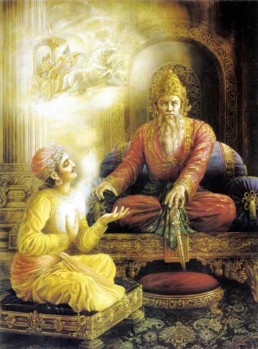Swami Chinmayananda
Swami Chinmayananda Commentary
Addressing his master as “the best among the twice-born,” Duryodhana now repeats the names of the distinguished heroes in his own army. A weak man, to escape from his own mental fears, will whistle to himself in the dark. The guilty conscience of the tyrant king had undermined all his mental strength. The more he realised the combined strength of the great personalities arrayed in the opposite enemy camp, the more abjectly nervous he felt, in spite of the fact that his own army was also manned by highly competent heroes. In order to revive himself, he wanted to hear words of encouragement from his teachers and elders. But when Duryodhana met Drona, the acharya chose to remain silent and the helpless king had to find for himself new means of encourgement to revive his own drooping enthusiasm. Therefore, he started enumerating the great leaders in his own army.
When a person has thus completely lost his morale due to the heavy burden of his own crimes weighing on his conscience, it is but natural that he loses all sense of proportion in his words. At such moments of high tension an individual clearly exhibits his true mental culture. He addresses his own teacher as “the best among the twice-born.”
A Brahmana is considered as “twice-born” because of his inner spiritual development. When born from his mother’s womb man comes into the world only as the animal called man. Thereafter, through study and contemplation he gains more and more discipline, and a cultured Hindu is called a Brahmana (Brahmin).
After all, Drona is a Brahmana by birth and as such he must have a greater share of softness of heart. Moreover, the enemy lines are fully manned by his own dear students. As a shrewd dictator, Duryodhana entertained shameless doubts about the loyalty of his own teacher.
This is but an instinctive fear which is natural with all men of foul motives and crooked dealings. When we are not ourselves pure, we will project our own weaknesses and impurities on others who are working around us as our subordinates.
Adi Sankara Commentary
Sri Sankaracharya did not comment on this sloka. The commentary starts from 2.10.
The Bhagavad Gita with the commentary of Sri Sankaracharya – Translated by Alladi Mahadeva Sastry
Holy Geeta – Commentary by Swami Chinmayananda
The Bhagavad Gita by Eknath Easwaran – Best selling translation of the Bhagavad Gita
The Bhagavad Gita – Translation and Commentary by Swami Sivananda
Bhagavad Gita – Translation and Commentary by Bhaktivedanta Swami Prabupadha
Srimad Bhagavad Gita Chapter 1 – Verse 7 – 1.7 asmakam tu vishishta – All Bhagavad Gita (Geeta) Verses in Sanskrit, English, Transliteration, Word Meaning, Translation, Audio, Shankara Bhashya, Adi Sankaracharya Commentary and Links to Videos by Swami Chinmayananda and others – 1-7

